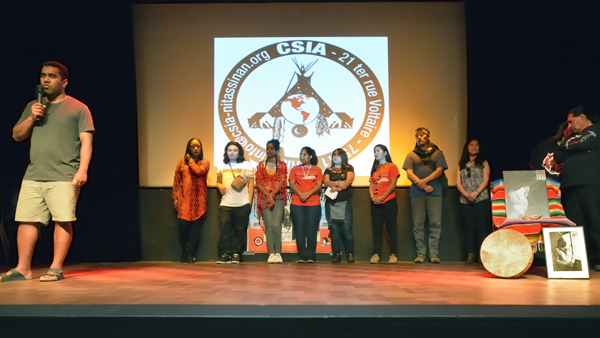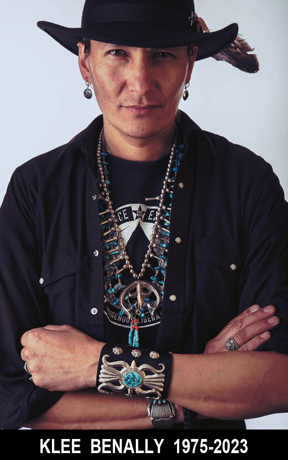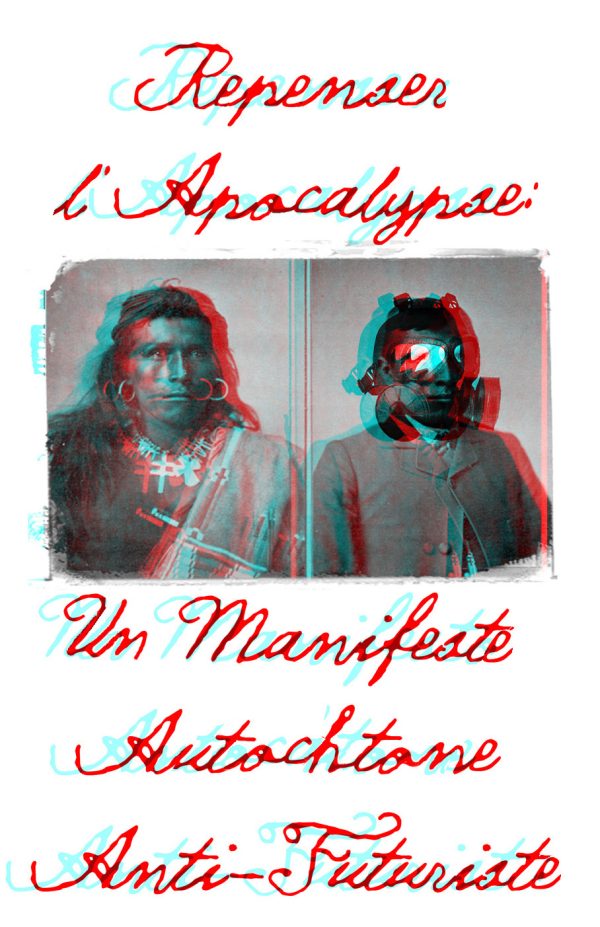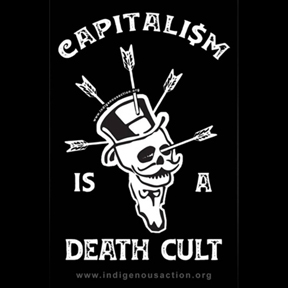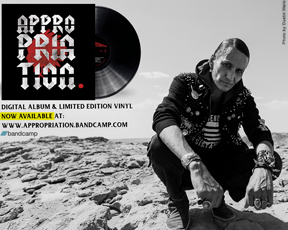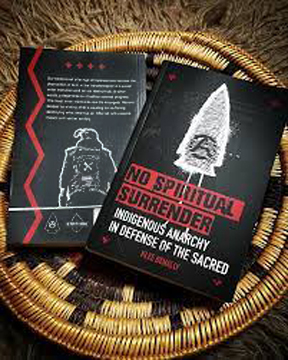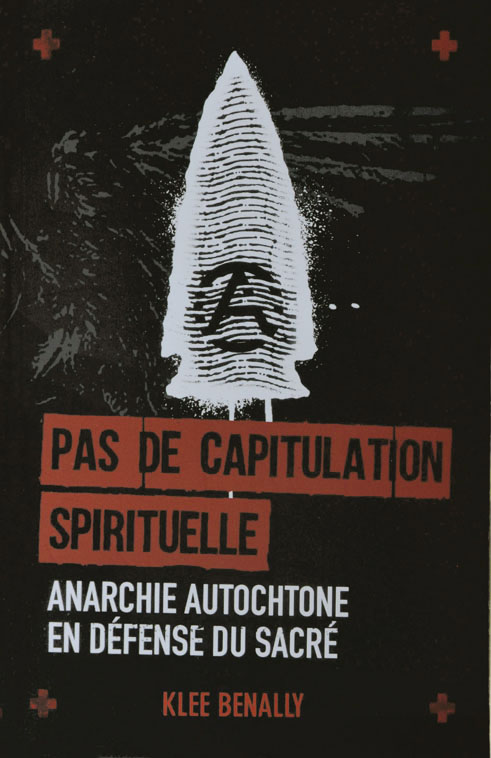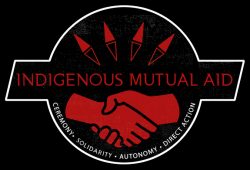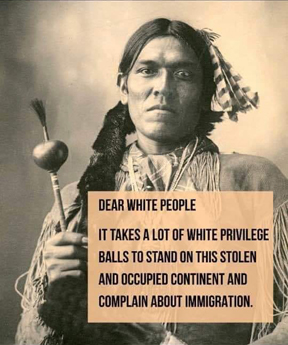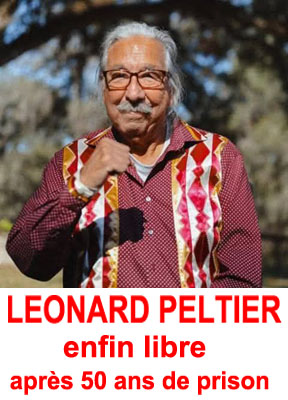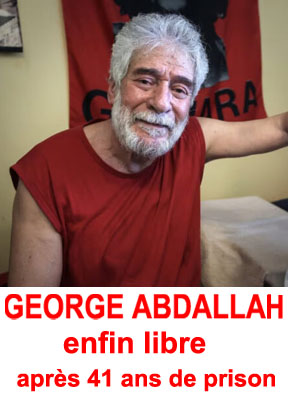COLONIALISTS WIN REFERENDUM IN KANAKY (“NOUVELLE CALEDONIE”) REPRESENTATIVE OF YOUNG KANAKS IN FRANCE SPOKE AT CSIA DAY OF SOLIDARITY
By Christine Prat, CSIA Français
November 4th, 2018
Also published on Censored News
Today, November 4th 2018, the colonialists won the referendum by which, inhabitants of Kanaky – so-called New Caledonia – had to decide for or against Independence. Supporters of colonialism won with a much fewer votes than expected. However, settlers of European origin being now in greater numbers than Indigenous people, they could still win.
A few decades ago, tensions raised, as France was encouraging massive European immigration. Violent incidents took place in the 1980s. Two agreements were signed, in Paris in 1988, and in Nouméa in 1998. This agreement decided that several referendums would be held, in which only people already living in Kanaky in 1998 and their descent could take part. However, the immigration policy had started earlier, so that settlers arrived before 1998 are more numerous than Indigenous people.
Kanaky – ‘Nouvelle Calédonie’ – is on top of the United Nations list of countries to be decolonized. However, it is one of the biggest nickel producers on earth. Indigenous people and environmentalists say that digging mines for nickel is destroying the country, which is home to rare species, to exceptional fauna and flora. Those who oppose independence claim that, if France pulled out, the country would necessarily fall under Chinese influence. But this would mean that the world and Kanaky would remain submitted to capitalism, that will go on exploiting nickel until the land is totally destroyed.
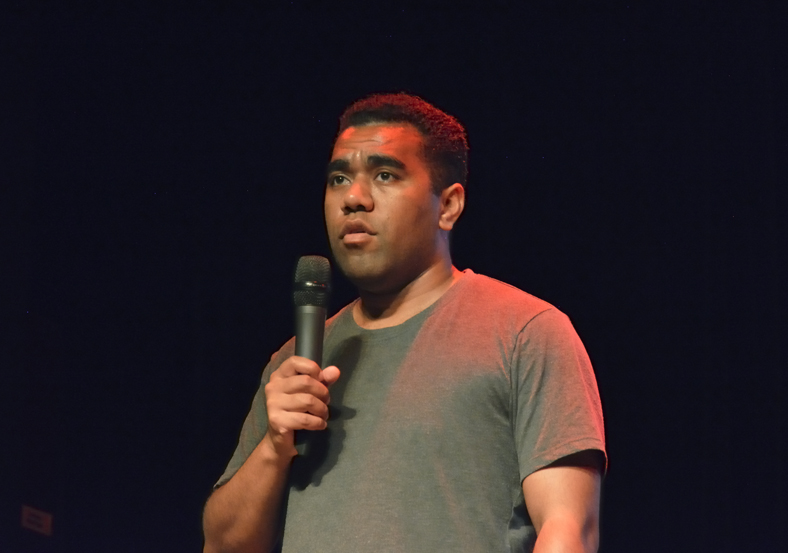 On October 13th 2018, a delegation of young Kanaks, led by Yvannick Waikata, spoke person for the Young Kanaks Movement in France, was invited to the Annual Day of Solidarity organized by CSIA-nitassinan, the French Committee for Solidarity with Indians of the Americas. This year, Native Americans from the USA, Chili, Argentina and “French” Guyana were speakers at the event.
On October 13th 2018, a delegation of young Kanaks, led by Yvannick Waikata, spoke person for the Young Kanaks Movement in France, was invited to the Annual Day of Solidarity organized by CSIA-nitassinan, the French Committee for Solidarity with Indians of the Americas. This year, Native Americans from the USA, Chili, Argentina and “French” Guyana were speakers at the event.
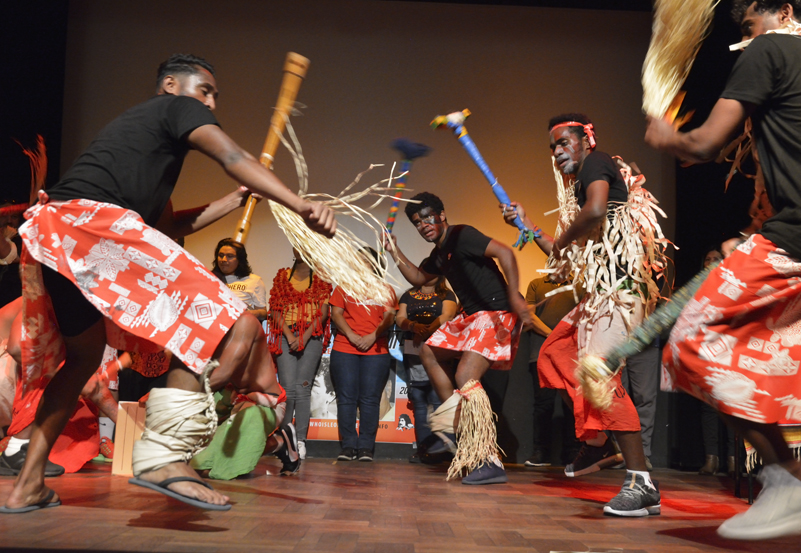 The Young Kanaks offered a traditional dance to welcome the Indigenous guests from the Americas.
The Young Kanaks offered a traditional dance to welcome the Indigenous guests from the Americas.
Yvannick first explained the meaning of the dance. He said the purpose was to bow before the guests and audience, as, in their country, doors are low so that they must bow to enter someone’s house. Bowing also means that they apologize as they are going to make noise. Originally, the purpose of the dance is to initiate young men to the art of war. It is also meant to show ‘their face’. Thus, the purpose of this dance was to show ‘their face’, their identity, for which they have been struggling since 1853. Yvannick said “since that old cloth is flown above our stone (Kanaky), the flag of that colonial empire”.
Yvannick spoke for the Young Kanaks in France. He spoke about the referendum that was to take place on November 4th, explaining: “Why a self-determination referendum? Because we are in a situation of colonizer to colonized. Those who will take part in this referendum are the colonized, us, the Kanaks. ‘Kanak’ is a Hawaiian word meaning ‘human being’.”
Then he went on summing up their history: the colonial conquest began in Tasmania, and in Hawaii. The French colonial empire started in “New Caledonia”, an island thus named by James Cook in 1774. The French conquered it in 1853. The goal was, ultimately, the end of the Kanak People.
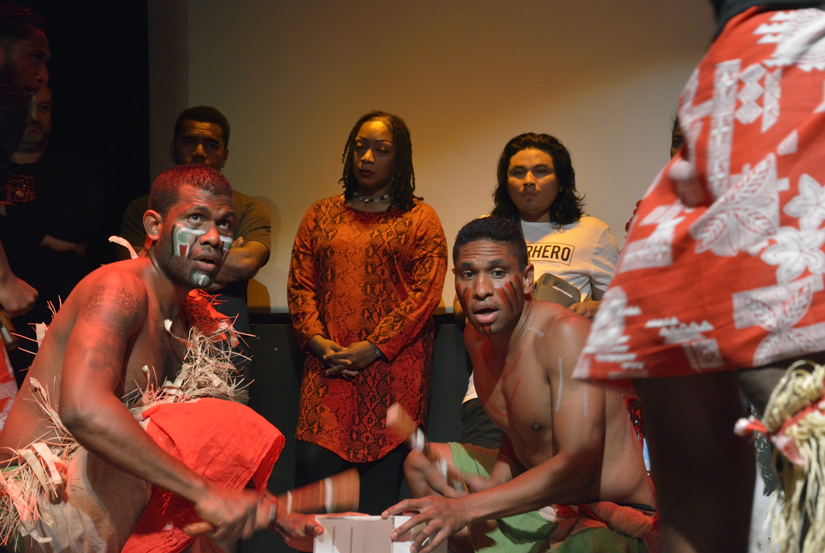 This is because of the denial of the Kanak People that they danced that day. “… when we dance somewhere, it is to show our identity, and that we are still alive”. Since 1774 and 1853, and later the policy of European immigration, the French have been trying to drown the Indigenous claim. So, they dance, to say they are still there, they still exist.
This is because of the denial of the Kanak People that they danced that day. “… when we dance somewhere, it is to show our identity, and that we are still alive”. Since 1774 and 1853, and later the policy of European immigration, the French have been trying to drown the Indigenous claim. So, they dance, to say they are still there, they still exist.
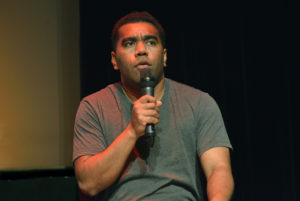 Yvannick reminded the audience that the murdered leader Jean-Marie Tjibaou, had organized the Festival ‘Melanesia 2000’. For that festival, the Indigenous people decided that they would no longer limit their sacred dances and cultural practices to ceremonies, but that they would show them publicly to affirm their existence. They wanted to break completely with what had been shown in France before, during ‘colonial exhibitions’. He stressed that it was important for them to dance in Paris before the referendum, to show their faces, their culture, their identity and their history. “Our history does not start with French colonization”. So, since ‘Melanesia 2000’, their struggle was “to place the Kanak claim for identity, the cultural field, into the political field”.
Yvannick reminded the audience that the murdered leader Jean-Marie Tjibaou, had organized the Festival ‘Melanesia 2000’. For that festival, the Indigenous people decided that they would no longer limit their sacred dances and cultural practices to ceremonies, but that they would show them publicly to affirm their existence. They wanted to break completely with what had been shown in France before, during ‘colonial exhibitions’. He stressed that it was important for them to dance in Paris before the referendum, to show their faces, their culture, their identity and their history. “Our history does not start with French colonization”. So, since ‘Melanesia 2000’, their struggle was “to place the Kanak claim for identity, the cultural field, into the political field”.
After that summary of the history from the 1980s to today, Yvannick said “We, the young people, are the generation born from those peace agreements. There have been two agreements, that of Matignon in 1988 et that of Nouméa in 1998. We are the generation that lived through that peace. For the November 4 referendum, the Young Kanaks Movement creates spaces to speak, to awake the awareness among our people. Of course, we did not live the civil war situation in ‘Nouvelle Calédonie’, those ‘events’, as historians put it, but it was a war, it actually was an independence war”.
The Young Kanaks Movement works to awake awareness about the Kanak People history, in particular that of the heroes of the struggle, as the French National Education does not do anything, does not even mention the Kanak People.
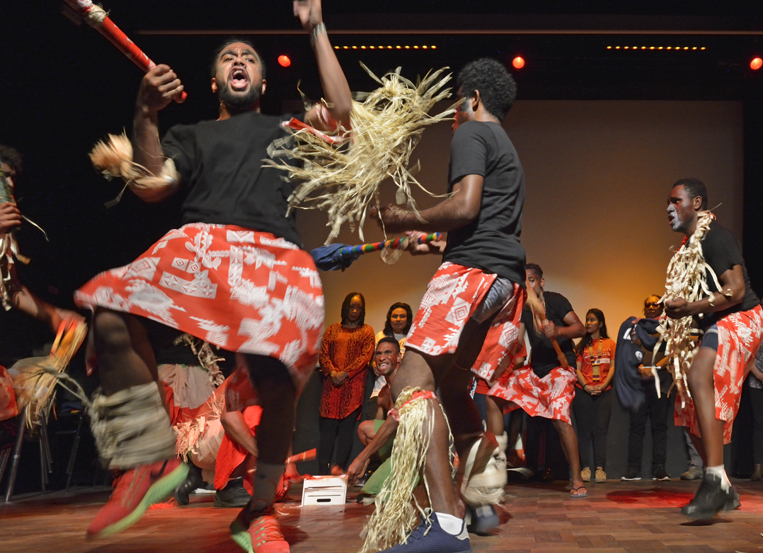 What the Young Kanaks Movement wants is an identity revival. Yvannick says “for us, it is important that you can identify us and see who we are. Not reduce us to what colonial exhibitions produced in the collective imagination of the French People. So, it is important to dance and show our culture. To come nearer, to learn to know each other. We do not blame the French People at all, we blame the colonial administration.” He added “you are also human beings, like us, so we can reach you”. The colonial exhibitions created an imaginary Other, supposed to be a savage. “At the last colonial exhibition, there was Christian Karembeu’s – star of the French National Football Team – grandfather. His grandfather was a school master in “Nouvelle Calédonie”, but he came here to impersonate a savage!”
What the Young Kanaks Movement wants is an identity revival. Yvannick says “for us, it is important that you can identify us and see who we are. Not reduce us to what colonial exhibitions produced in the collective imagination of the French People. So, it is important to dance and show our culture. To come nearer, to learn to know each other. We do not blame the French People at all, we blame the colonial administration.” He added “you are also human beings, like us, so we can reach you”. The colonial exhibitions created an imaginary Other, supposed to be a savage. “At the last colonial exhibition, there was Christian Karembeu’s – star of the French National Football Team – grandfather. His grandfather was a school master in “Nouvelle Calédonie”, but he came here to impersonate a savage!”
“When we come to dance here, it is to decolonize ourselves. The message we bring is to learn to know each other, through the Kanak People’s struggle. I want to thank you for being here and I hope we shall remain connected. We still need you, we still need solidarity. Thank you.”

